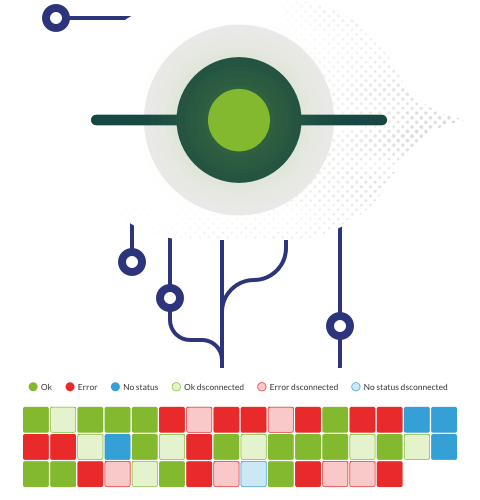Quantum computing: a step closer to what you called science fiction
It is likely that, proud of the speed of your fiberglass, the countless number of pixels on your smartphone, and the speed with which you get to download the chapters of your favorite TV show, you may already think that we have reached the limit of the advances of technology. But we are not even close, this is not over ladies and gentlemen. Every day someone comes up with a revolutionary idea to change the latest paradigm and everything that has happened until then. And although I have not taken part in any of it, I am really proud of the human race and its wit. But I am even more proud of quantum computing.
Today we will take an approach to one of those innovations that sound like science fiction and remind us of Asimov and K. Dick. We are talking about quantum computing.
What is quantum computing?
Hidden in their dungeons, with air conditioning and vending machines, leading companies such as Google, Microsoft, IBM or NASA work hard in quantum computing. It is likely that your project managers may already have an accurate picture about what quantum computing is. The rest of us can only wonder what it is and how they will manage to exploit it.
For now, it is known that it will not be able to make your graphics card run smoother, or magically mutate your processor to turn it into a superhero. It is something different to what we have conceived as computing so far, something totally new.
Quantum computing: Origins
Let us travel back in time, to the verge of the last century. “Light does not spread out like a wave in a pond. No! It spreads out divided into quanta“, said Mr. Einstein and Mr. Planck. Thanks to this “accessible” and “simple” idea and its subsequent development, mankind could understand matter, quantum superposition and its way of intertwining much better.
Thanks to this knowledge on quantum superposition and intertwining, we can overcome common computing limitations and go much farther.
Quantum computing: Nowadays
As we have mentioned, currently, some large enterprises have already begun to toy with quantum computers, and make researches by means of these computers, in order to achieve issue management hypervelocity and accurate data analysis.
Experts in the field know that we are still in the early stages of this kind of computers, yet they see them as the future. It is a pity, but for now, only large corporations have significant access to this type of technology.
Quantum computing: What is it about?
A quantum computer uses qubits to operate. That means that while traditional computers use the already well-known bits, quantum computers use qubits. Qubits allow quantum computers to solve problems faster than traditional computers. In fact, there are problems that only quantum computing can solve, while ordinary computers fall short.
Qubits, also known as “quantum bits”, are the smallest unit of the so-called “quantum information”. While the bit, the smallest unit of traditional information, provides binary solutions (ones and zeros), the qubit offers much more due to the complex laws of quantum physics, solving a higher number of operations at the same time or performing countless combinations simultaneously.
Due to its nature, there are multiple fields where the qubits could be useful. For example, instant transfer of information on our planet or in the universe, “unhackeable” communications security, or even taking the Big Data to places where we have not been able to dive into until now.
Quantum computing: some barriers to overcome
But there are still some problems that need to be solved. It is not easy to say this, but many of the codes, algorithms and all that stuff that makes up the essence of a traditional computer could not be used in these new quantum computers. It would be necessary to create and set quantum algorithms, which is not easy task for now. Only if we had these quantum algorithms, then we would be talking about a considerable improvement.
Another problem that we cannot overlook is a very important one for quantum computing. How do we build computers? That’s right, compared to a conventional PC, a quantum computer is far way too complex. Firstly, they would run at a temperature that borders -459 ° F, close to the absolute zero. Moreover, the materials needed must be superconducting (which are quite expensive and sometimes difficult to obtain). Not to mention the equipment needed to read and manage the qubits, which is also quite complex.
Let us also bear in mind the fact that the qubits may behave like irritating children who are not stable enough: too sensitive to disturbances or loud noises. This could mean miscalculations. The result of a simple operation like 2 +2 calculated by an affected qubit can be 5 by the book.
That is why quantum computing will be restricted, for now, to high-level corporations that truly need to solve a great amount problems which at the same time might even be terribly complex. Although, if you think carefully, the beginning of conventional computing was somewhat similar, so you guys do not need to worry.
However, if you cannot wait for new updates, why don’t you take a look at Pandora FMS? As you may already know, Pandora FMS is a flexible monitoring software, able to monitor devices, infrastructures, applications, services and business processes.
Would you like to know better what it is about? Click here: https://pandorafms.com
Or you can also send us any questions that you may have about Pandora FMS. Do it in a very simple way, thanks to the contact form located at the following address: https://pandorafms.com/contact/
Pandora FMS team will be glad to help you!

Traductora a francés e inglés. Me encantan las lenguas. Amante de la ropa oversize, la tarta de queso y el chocolate caliente en invierno. Me gusta leer, escuchar música, viajar y explorar cosas nuevas. Mi frase más temida por aquellos que me conocen es “he estado pensando…”
Translator into French and English. I love languages. Lover of oversized clothes, cheesecake and hot chocolate in winter. I like reading, listening to music, travelling and exploring new things. My most feared phrase by those who know me is “I’ve been thinking…”

















